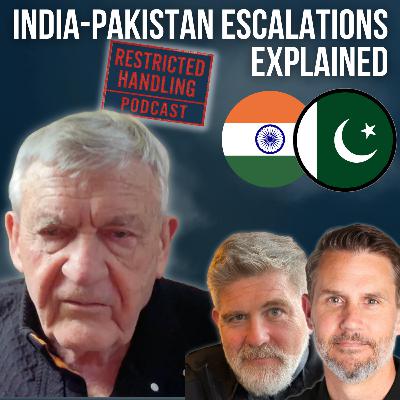Ryan Glenn Ed - India Pakistan Escalations Explained w/ CIA and State Experts
Description
Tensions between India and Pakistan are rising again—and in this episode of the Restricted Handling Podcast, host Ryan Fugit sits down with co-host Glenn Corn and special guest Edward Fugit to break down the recent terror attacks in New Delhi and Islamabad, the rapid response on both sides, and the alarming speed at which this flare-up unfolded.
Drawing on decades of combined CIA, diplomatic, military, and intelligence experience, the trio explores why this region continues to teeter on the edge of crisis—and what makes this moment uniquely dangerous.
They examine the two attacks that struck both capital cities within 48 hours—something veteran practitioners say is unprecedented. Was this coordinated? A coincidence? Or a sign of evolving proxy strategies? Glenn discusses the early investigation results, India’s unusually measured response, and Pakistan’s quick attribution to the TTP. From Kashmir to the border regions to intelligence-linked militant groups, the conversation dives into why attribution is rarely straightforward in South Asia.
Edward Fugit, former political advisor in Islamabad and CENTCOM, offers insider context on Pakistan’s internal dynamics, the evolving role of its Army Chief, and the long historical roots of India-Pakistan hostility. He explains how both sides carefully manage escalation—despite decades of deadly attacks—because they deeply understand the catastrophic risk of war between two nuclear-armed states. Still, he warns how a single miscalculation, rogue commander, or unsanctioned militant action could push events past the point of control.
The episode also covers:
• Pakistan’s new “Chief of Defense Forces” role and why this power shift matters
• China and Russia’s longstanding influence in the subcontinent—and how the U.S. fits into the modern geopolitical triangle
• India’s re-establishment of its embassy in Kabul and why Pakistan sees Afghanistan as its strategic backyard
• How intelligence services like ISI and RAW operate, interact with their militaries, and influence regional events
• Personal stories from life and work in Pakistan, from diplomacy and intelligence to humorous moments in the field
Glenn and Edward both stress that while neither India nor Pakistan wants a full-scale war, history shows how quickly tensions can spiral. With both militaries deployed face-to-face at some of the highest altitude battle positions in the world, even a small border clash can become a national crisis. The trio concludes with guidance for how U.S. policymakers should approach the region today—constant attention, balanced engagement, and a sober understanding of how interconnected South Asia is with China, Russia, Central Asia, and Afghanistan.
If you want clear, experienced, real-world analysis of today’s most volatile geopolitical flashpoints, this is an episode you shouldn’t miss.
👉 Get the free daily intel brief that Ryan and Glenn read: RestrictedHandling.com
👉 Subscribe for more deep-dive conversations on geopolitics, intelligence, national security, and global conflict.






